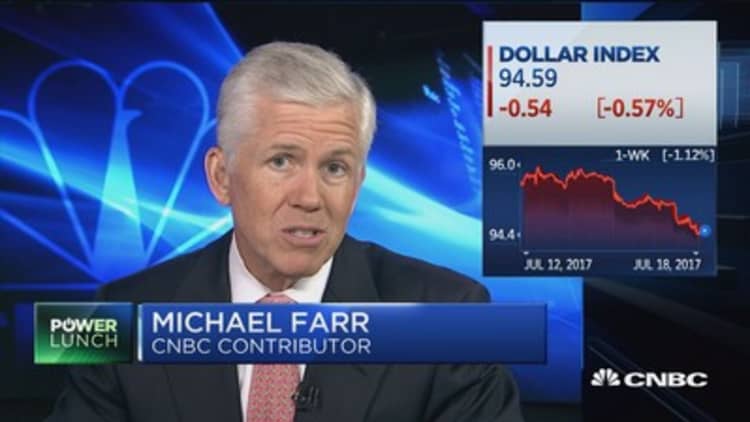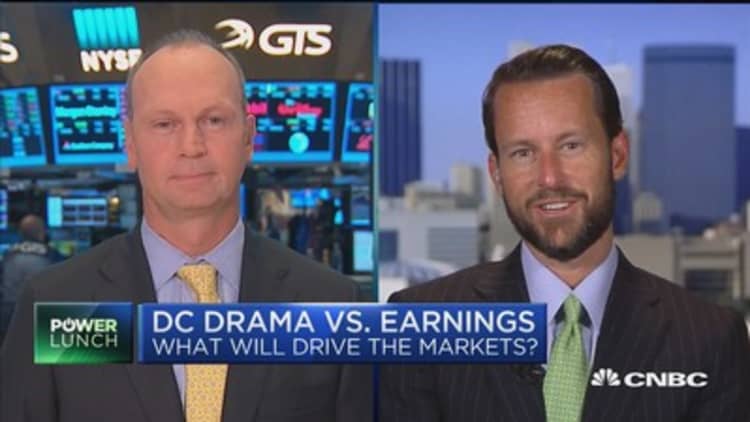
Wall Street still expects Washington to come up with some type of whittled down tax bill, with simple tax cuts more likely than tax reform.
The Senate's failure to bring a revised health-care bill up for a vote rattled markets and sparked speculation Congress would not be able to do anything else on the Trump agenda, including tax reform.
Analysts say one big catalyst that makes some tax bill more likely is the fact that House members will not want to face midterm elections next year with no major achievements. That would argue the cuts could then target the individual taxpayer, but some strategists say Congress is more likely to go after a significant tax cut for corporations. But size, scope and timing are all big unknowns.
"We usually only see legislation when there's a crisis," said Edward Mills, financial policy analyst at FBR, noting the tax reform plan has no natural deadline. "That's been the problem with a tax bill. It hasn't had a natural catalyst. What I've been waiting for is the political crisis of no real accomplishments by the Trump administration or congressional Republicans, prompting them to do a tax bill."
"We're as close to a political crisis as we get right now," he said, adding work could begin on the bill by the end of the summer. Analysts also expect to see tensions rising in Washington within Republican ranks, as Congress attempts to deal with the budget and debt ceiling this fall. But after that, the focus should turn quickly to tax cuts.
Opinions on what type of tax bill Congress will come up with are varied, with some firms expecting just corporate tax cuts and no reform, to that would significantly change the tax code.
"I think there's near unanimity that the corporate tax rate is too high. There's an effort to find a way to incorporate a reduced rate for small businesses," said Tom Block, Washington policy analyst at Fundstrat. "There's a strong view that when we change the corporate tax rate, we allow for a special repatriation holiday." Repatriation would be a one-time holiday allowing corporations with cash overseas to bring it home at a one-time low rate.
"I still think the market is expecting very little out of the administration and Congress. A lot of people now expect not even a tax cut could get through," said Wells Fargo's director of rate strategy, Michael Schumacher. He said Treasury yields may have fallen too much, but they are also reflecting the market attitude that the Fed is sounding more dovish and expectations are lower that the Fed will hike interest rates this year.
Based on the variety of views and expectations in the markets, analysts say it's difficult to gauge how much impact a tax bill will have on markets when it's introduced.
With each passing month this year, the air has come out of the Trump trade, and that was also the case Tuesday after the Senate failed to vote on a modified health-care plan to replace Obamacare.
Republicans had scheduled replacing Obamacare ahead of tax reform this year, since they were looking for savings and tax cuts in the plan to help with tax reform. But now Sen. Mitch McConnell has said the Senate will just vote on ending Obamacare, with a two-year delay so it can work on a replacement.
Mills expects Congress to take a big swipe at the corporate tax rate, which is now 35 percent. He said it could be cut to the 15 percent level, proposed by President Donald Trump. n the mid- to low-20 percent range. But Mills said an argument could be made that just cutting to a low corporate tax rate would have some of the impact that other tax plans are hoping for. For instance, companies might no longer park money overseas and invest more in the U.S. if the U.S. tax rate was low enough.
"There is a 'go big, or go home' crowd, spearheaded by Gary Cohn," Mills said. Cohn is the White House's chief economic advisor who is one of a handful of individuals working on a bill, together with representatives from the House and Senate.
On Tuesday, market confidence in lawmakers dipped again as the Senate failed on health care, and so did the dollar. The dollar index reached its lowest level since September and was down a half percent in late trading. The 10-year Treasury yield declined to 2.26 percent. But stocks turned earlier losses around, and the and Nasdaq both ended up closing at all-time highs. The Dow was lower on the day, but well above its session lows.
QMA portfolio manager Ed Keon said he still expects a corporate tax plan this year, but nothing like the sweeping reform proposed by the House, with a 20 percent corporate tax rate, a border adjustment tax and a new territorial tax approach on foreign profits.
"It's going to have to be revenue neutral which means it's not going to do much for corporate profits, or a fiscal pulse. There might be some helpful things that make the law fairer, less complicated but they're not going to necessarily give a further push to stocks that are already at high valuations," he said.
The play-by-play from Washington will continue to dominate markets Wednesday, as stocks could also be buffeted by a wave of earnings news.
McConnell said the Senate is expected to bring a vote soon on a bill to repeal Obamacare, but with a two-year delay so Congress can develop a replacement by then. But the prospects for that bill are not high and the next steps are not clear after the Senate could not find enough Republican members to push through a revised health-care plan.
Besides Washington, markets will be watching earnings reports from , M&T Bank and Northern Trust ahead of the open. After the bell, American Express, Alcoa, Qualcomm, T-Mobile, SLM and Kinder Morgan report.
There is also housing starts and building permits data at 8:30 a.m. ET.
Correction: This article has been updated to reflect that Edward Mills is a financial policy analyst at FBR. A quotation from Tom Block was also revised.
WATCH: Can tax reform succeed?



